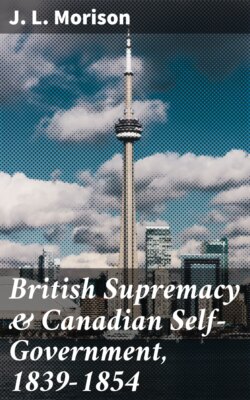Читать книгу British Supremacy & Canadian Self-Government, 1839-1854 - J. L. Morison - Страница 4
На сайте Литреса книга снята с продажи.
PREFACE
ОглавлениеTable of Contents
The essay which follows had been printed, and was on the point of being published, when the outbreak of war involved my venture in the general devastation from which we are only now emerging. More than four years of military service lie between me and the studies of which this book is the summary. It was written under one dispensation; it is being published under another. My first impulse, therefore, was to ask whether the change which has rendered so much of the old world obsolete had not invalidated also the conclusions here arrived at. But reflection has simply confirmed me in the desire to complete the arrangements for publication. Self-government is the keynote of the essay, and it is unlikely that self-government will cease to be the central principle of sane politics either in the British Empire or in the world outside. I watched a Canadian division coming out of the last great battle in France, battered and reduced in numbers, but with all its splendid energy and confidence untouched. The presence of the Canadians there, their incomparable spirit and resolution, the sacrifices they had just been making, with unflinching generosity, for the Empire, seemed only the last consequences of the political struggle for autonomy described in the pages which follow. They would have been impossible had the views of all the old imperialists from Wellington to Disraeli prevailed.
The material on which this volume is based falls into three groups. First in importance are the state papers and general correspondence of the period, contained in the Canadian Archives at Ottawa. In addition to the correspondence, ordinary and confidential, between the Secretaries of State for the Colonies, and the Governors-General, from 1839 to 1867, I read two very notable collections, designated in the foot-notes the Bagot Correspondence and the Elgin-Grey Correspondence. In the former are contained not only Bagot's private correspondence with Lord Stanley, but also letters from Bagot's British friends and Canadian political advisers. These constitute the most important evidence which exists for Bagot's year of office. In the same way, the private correspondence, carried on between Earl Grey and the Earl of Elgin from 1847 to 1852, takes precedence of all other Canadian material of that period; and is, indeed, the most enlightening series of documents in existence on mid-Victorian Colonial policy.
The second group is composed of pamphlets and early newspapers, more especially the admirable collection of pre-confederation pamphlets in the Archives at Ottawa, and the Bell and Morris collections at Queen's University. Kingston. I cannot pretend to have mastered all the material supplied by the newspapers of the period; but I have attempted to work through such representative journals as the Toronto Globe, the Montreal Witness, and the Kingston papers published while Kingston was capital of the united Provinces. I consulted certain others, French and English, on definite points of political interest, such as the reappearance of Papineau in politics in 1847.
The Canadiana of Queen's University Library gave me my third group of documents: and the facts from books were confirmed or modified by information gathered, chiefly in Kingston, from persons whose memories of the period under discussion were still fresh and interesting.
As the work proceeded, certain impressions were very definitely created in my mind. It seemed clear, in the first place, that no statesman, whose experience was limited by unbroken residence in Europe, quite understood the elements which, between 1839 and 1867, constituted the Home Rule problem in Canada. More especially on fundamental points concerning Canadian opinion, and the general temper of the populace, even the best men in England seemed singularly ignorant. A second impression was that, while the colony remained throughout essentially loyal, and while the political leaders in Canada displayed really great qualities of statesmanship at critical moments, the general development of Canadian political life was seriously delayed by the crudities and rudeness of provincial politicians. British ignorance was not the only obstacle in the way.
The last impression was that the relations between Britain and Canada depended then, as now, not on constitutional forms, or commercial bargains, or armed protection, but on racial solidarity, and community in social and moral ideals. It was this solidarity, far more than conscious statesmanship, which held Canada and Britain together. These impressions I have tried to analyse and elucidate in the chapters which follow.
I have to thank the Dominion Archivist, Dr. A. G. Doughty, for many kindnesses, and more especially for permitting me to read the Elgin-Grey Correspondence. To my friends, Mr. K. K. M. Leys, of University College, Oxford, Dr. Adam Shortt, Ottawa, and Professor W. D. Taylor, of Queen's University, Kingston, I am indebted for advice and information. Mr. James MacLehose and Dr. George Neilson made the final stages of printing easy by their generous assistance. The opinions which I express are my own, occasionally in spite of my friends' remonstrances.
J. L. MORISON.
INNELLAN, ARGYLLSHIRE,
May, 1919.
